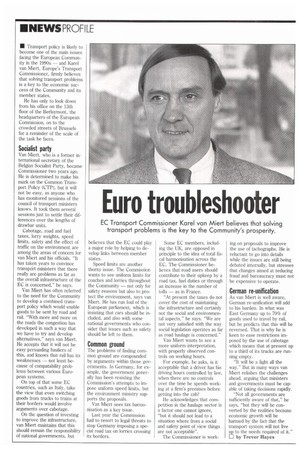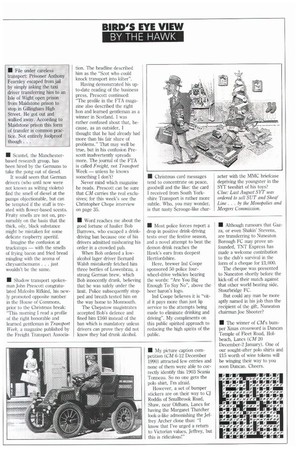Euro troubleshooter
Page 22

Page 23

If you've noticed an error in this article please click here to report it so we can fix it.
believes that the EC could play a major role by helping to develop links between member states.
Speed limits are another thorny issue. The Commission wants to see uniform limits for coaches and lorries throughout the Community — not only for safety reasons but also to protect the environment, says van Miert. He has run foul of the European parliament, which is insisting that cars should be included, and also with some national governments who consider that issues such as safety should be left to them.
Common ground
The problems of finding common ground are compounded by arguments within those governments. In Germany, for example, the government generally has been resisting the Commission's attempts to impose uniform speed limits, but the environment ministry supports the proposals.
Van Miert sees tax harmonisation as a key issue.
Last year the Commission had to resort to legal threats to stop Germany imposing a special road tax on lorries crossing its borders. Some EC members, including the UK, are opposed in principle to the idea of total fiscal harmonisation across the EC. The Commissioner believes that road users should contribute to their upkeep by a road tax, fuel duties or through an increase in the number of tolls — as in France.
"At present the taxes do not cover the cost of maintaining the infrastructure and certainly not the social and environmental aspects," he says. "We are not very satisfied with the way social legislation operates as far as road haulage is concerned."
Van Miert wants to see a more uniform interpretation, with properly observed controls on working hours.
For example, he asks, is it acceptable that a driver has his driving hours controlled by law, when there are no controls over the time he spends working at a firm's premises before getting into the cab?
He acknowledges that competition in the haulage sector is a factor one cannot ignore, "but it should not lead to a situation where from a social and safety point of view things are not acceptable".
The Commissioner is work
ing on proposals to improve the use of tachographs. He is reluctant to go into details while the issues are still being debated internally, but stresses that changes aimed at reducing fraud and bureaucracy must not be expensive to operate.
German re-unification
As van Miert is well aware, German re-unification will add to his burden. In what was East Germany up to 70% of goods used to travel by rail, but he predicts that this will be reversed. That is why he is keen to ease restrictions imposed by the use of cabotage which means that at present up to a third of its trucks are running empty.
"It will be a fight all the way." But in many ways van Miert relishes the challenges ahead, arguing that ministers and governments must be capable of taking decisions rapidly.
"Not all governments are sufficiently aware of that," he says, "but they will be converted by the realities because economic growth will be harmed by the fact that the transport system will not live up to the needs required of it."
by Trevor Hayes • Scantel, the Manchesterbased research group, has been hired by the Germans to take the pong out of diesel.
It would seem that German drivers (who until now were not known as wilting violets) find the smell of diesel at the pumps objectionable, but can be tempted if the stuff is treated with flower-based scents. Fruity smells are not on, presumably on the basis that the thick, oily, black substance might be mistaken for some delicate raspberry aperitif.
Imagine the confusion at truckstops — with the smells of frying bacon and fried bread mingling with the aroma of chrysanthemums . . just wouldn't be the same.
IN Shadow transport spokesman John Prescott congratulated Malcolm Rifkind, his newly promoted opposite number in the House of Commons, prior to the Christmas break: "This morning I read a profile of the right honorable and learned gentleman in Transport Week, a magazine published by the Freight Transport Associa
tion. The headline described him as the "Scot who could knock transport into kilter".
Having demonstrated his upto-date reading of the business press, Prescott continued: "The profile in the FTA magazine also described the right hon and learned gentleman as a winner in Scotland. I was rather confused about that, because, as an outsider, I thought that he had already had more than his fair share of problems." That may well be true, but in his confusion Prescott inadvertently spreads more. The journal of the rrA is called Freight, not Transport Week — unless he knows something I don't?
Never mind which magazine he reads. Prescott can be sure that CM carries the real exclusives; for this week's see the Christopher Chope interview on page 35.
• Word reaches me about the good fortune of haulier Bob Burrows, who escaped a drinkdriving ban because one of his drivers admitted mishearing his order in a crowded pub.
When Bob ordered a lowalcohol lager driver Bernard Walsh mistakenly fetched him three bottles of Lowenbrau, a strong German brew, which Bob innocently drank, believing that he was safely under the limit. Police subsequently stopped and breath tested him on the way home to Monmouth.
The Chepstow magistrates accepted Bob's defence and fined him 2160 instead of the ban which is mandatory unless drivers can prove they did not know they had drunk alcohol. / Christmas card messages tend to concentrate on peace, goodwill and the like: the card I received from South Yorkshire Transport is rather more subtle. Who, you may wonder, is that nasty Scrooge-like char • Most police forces report a drop in positive drink-driving tests over the festive season, and a novel attempt to beat the demon drink reaches the Hawk's ears from deepest Hertfordshire.
Here, brewer Ind Coope sponsored 50 police fourwheel-drive vehicles bearing the words: "Are You Big Enough To Say No", above the beer baron's logo.
Ind Coope believes it is "vital it pays more than just lip service to the attempts being made to eliminate drinking and driving". My compliments on this public spirited approach to reducing the high spirits of the public.
/ My picture caption competition (CM 6-12 December 1990) attracted few entries and none of them were able to correctly identify this 1903 Scania Tonneau. So no one gets the polo shirt, I'm afraid.
However, a set of bumper stickers are on their way to CJ Roddis of Smallbrook Road, Shaw, near Oldham, Lancs for having the Margaret Thatcher look-a-like admonishing the Jeffrey Archer clone thus: "I know that I've urged a return to Victorian values, Jeffrey, but this is ridiculous!" • Although rumours that Gazza, or even Shakin' Stevens, are transferring to Nuneaton Borough FC may prove unfounded, TNT Express has made a welcome contribution to the club's survival in the form of a cheque for i1,000.
The cheque was presented to Nuneaton shortly before the kick-off of their match against that other world beating side, Stourbridge FC.
But could any man be more aptly named in his job than the recipient of the gift, Nuneaton chairman Joe Shooter?
• The winner of CM's bumper Xmas crossword is Duncan Temple of Fleet Road, Holbeach, Lanes (CM 20 December-2 January). One of our sought-after polo shirts and 215 worth of wine tokens will be winging their way to you soon Duncan. Cheers.
































































